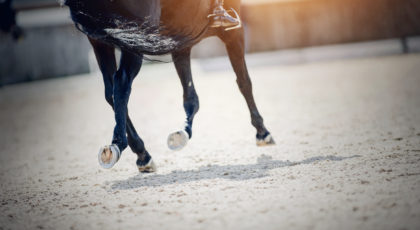Say you’re a passenger in a car and that car gets into an accident.
Maybe it slipped on black ice and collided with another vehicle. Or the driver fell asleep listening to Coldplay in the wee morning hours. Whatever the cause, there’s peace of mind in knowing that should you be injured in an accident, the driver’s automotive insurance will compensate you for medical bills, loss of income, and other related expenses.
With horses, those rules don’t apply.
“No auto or truck insurance covers any damages on horses,” says Steven Bluman, CEO for the new on-demand horse transportation app, Equo.
“The only way for a horse to be covered in the event of an accident on the road is for the horse to be insured with a horse insurance provider, such as Marshall Sterling or Kilkenny.”
Commercial carriers offer little more protection, he continues.
“Commercial carriers will give the owner a Bill of Lading, which includes a declared value for each horse they are transporting. This means, in the event of the horse’s death or destruction, the carrier is liable to pay only the declared value. It varies from company to company,” explains Bluman.
So what can a horse owner do to protect their precious cargo?
To start, mitigate the potential costs of an accident by insuring your horse before he hits the road. Secondly, be proactive in accident prevention by ensuring he’s riding with a reputable driver. Different shipping companies adhere to different standards.
“All drivers or companies that wish to work with Equo must pass our strict background check and meet our safety inspection standards for their trucks and trailers,” says Bluman.
“We also give the user the option to only ship their horses with drivers who have a CDL and DOT Number.”
A DOT is regulated by the US Department of Transportation and applies to all vehicles used for business purposes. DOT verifies that a driver’s equipment is certified and that the driver has taken the necessary steps to meet Federal Motor Carriers Safety Administration standards.
What, if any, additional safety measures are in place during travel will also vary by company. As a baseline, most reputable shippers will check-in on the horses every few hours and provide you with the driver’s cell number for updates during transit.
Equo goes above and beyond to help ensure safe travels with customized care and safety features. These include:
- An emergency response system that puts all drivers in 24/7 communication with their logistics department and a panic button for extreme emergencies.
- Driver profiles on every Equo driver that include a picture profile complete with ratings and reviews so riders know exactly who is going to drive their horse before they book the trip.
- Smartphones with GPS capabilities on all drivers at all times.
- A minimum of two years of experience for all drivers.
- Scheduled backup drivers and partner vets* on call in case they’re needed.
- Ride along space for one human on most Equo rides.**
- Custom updates on the condition of the horses and his hay and water intake at scheduled checkpoints.
- Photo updates from your driver via text message upon request.
The bottom line: most horse carriers offer little to no protection for owners in the unfortunate event of an accident.
“The responsibility is on the horse owner. We suggest talking to a horse insurance agency to get a quote and a complete picture on how it works,” says Bluman.
“It’s important that horse owners know their options, so they can make informed decisions on their horses shipping care and get back to focusing on what they do best—enjoying their horse!”
Sign up to be an Equo Driver and Earn $100 BONUS! Don’t delay, the bonus is only good through December 31st!
*Subject to availability.
**Check the availability on your ride so you can register the person riding along.


 December 16, 2016
December 16, 2016 



























